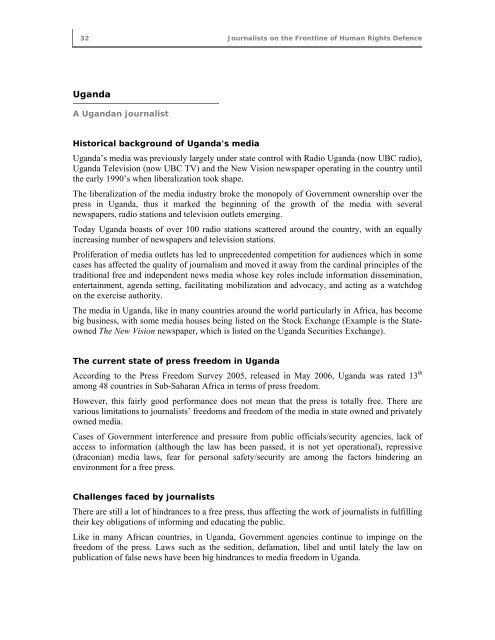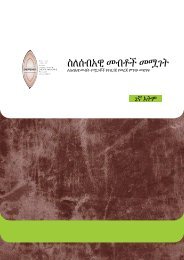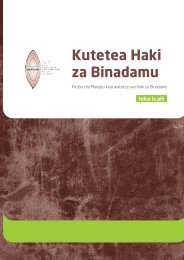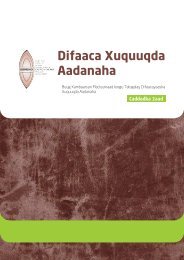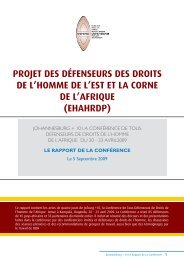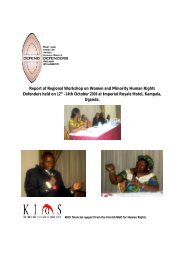English PDF - East and Horn of Africa Human Rights Defenders ...
English PDF - East and Horn of Africa Human Rights Defenders ...
English PDF - East and Horn of Africa Human Rights Defenders ...
Create successful ePaper yourself
Turn your PDF publications into a flip-book with our unique Google optimized e-Paper software.
32Journalists on the Frontline <strong>of</strong> <strong>Human</strong> <strong>Rights</strong> DefenceUg<strong>and</strong>aA Ug<strong>and</strong>an journalistHistorical background <strong>of</strong> Ug<strong>and</strong>a's mediaUg<strong>and</strong>a’s media was previously largely under state control with Radio Ug<strong>and</strong>a (now UBC radio),Ug<strong>and</strong>a Television (now UBC TV) <strong>and</strong> the New Vision newspaper operating in the country untilthe early 1990’s when liberalization took shape.The liberalization <strong>of</strong> the media industry broke the monopoly <strong>of</strong> Government ownership over thepress in Ug<strong>and</strong>a, thus it marked the beginning <strong>of</strong> the growth <strong>of</strong> the media with severalnewspapers, radio stations <strong>and</strong> television outlets emerging.Today Ug<strong>and</strong>a boasts <strong>of</strong> over 100 radio stations scattered around the country, with an equallyincreasing number <strong>of</strong> newspapers <strong>and</strong> television stations.Proliferation <strong>of</strong> media outlets has led to unprecedented competition for audiences which in somecases has affected the quality <strong>of</strong> journalism <strong>and</strong> moved it away from the cardinal principles <strong>of</strong> thetraditional free <strong>and</strong> independent news media whose key roles include information dissemination,entertainment, agenda setting, facilitating mobilization <strong>and</strong> advocacy, <strong>and</strong> acting as a watchdogon the exercise authority.The media in Ug<strong>and</strong>a, like in many countries around the world particularly in <strong>Africa</strong>, has becomebig business, with some media houses being listed on the Stock Exchange (Example is the StateownedThe New Vision newspaper, which is listed on the Ug<strong>and</strong>a Securities Exchange).The current state <strong>of</strong> press freedom in Ug<strong>and</strong>aAccording to the Press Freedom Survey 2005, released in May 2006, Ug<strong>and</strong>a was rated 13 thamong 48 countries in Sub-Saharan <strong>Africa</strong> in terms <strong>of</strong> press freedom.However, this fairly good performance does not mean that the press is totally free. There arevarious limitations to journalists’ freedoms <strong>and</strong> freedom <strong>of</strong> the media in state owned <strong>and</strong> privatelyowned media.Cases <strong>of</strong> Government interference <strong>and</strong> pressure from public <strong>of</strong>ficials/security agencies, lack <strong>of</strong>access to information (although the law has been passed, it is not yet operational), repressive(draconian) media laws, fear for personal safety/security are among the factors hindering anenvironment for a free press.Challenges faced by journalistsThere are still a lot <strong>of</strong> hindrances to a free press, thus affecting the work <strong>of</strong> journalists in fulfillingtheir key obligations <strong>of</strong> informing <strong>and</strong> educating the public.Like in many <strong>Africa</strong>n countries, in Ug<strong>and</strong>a, Government agencies continue to impinge on thefreedom <strong>of</strong> the press. Laws such as the sedition, defamation, libel <strong>and</strong> until lately the law onpublication <strong>of</strong> false news have been big hindrances to media freedom in Ug<strong>and</strong>a.


